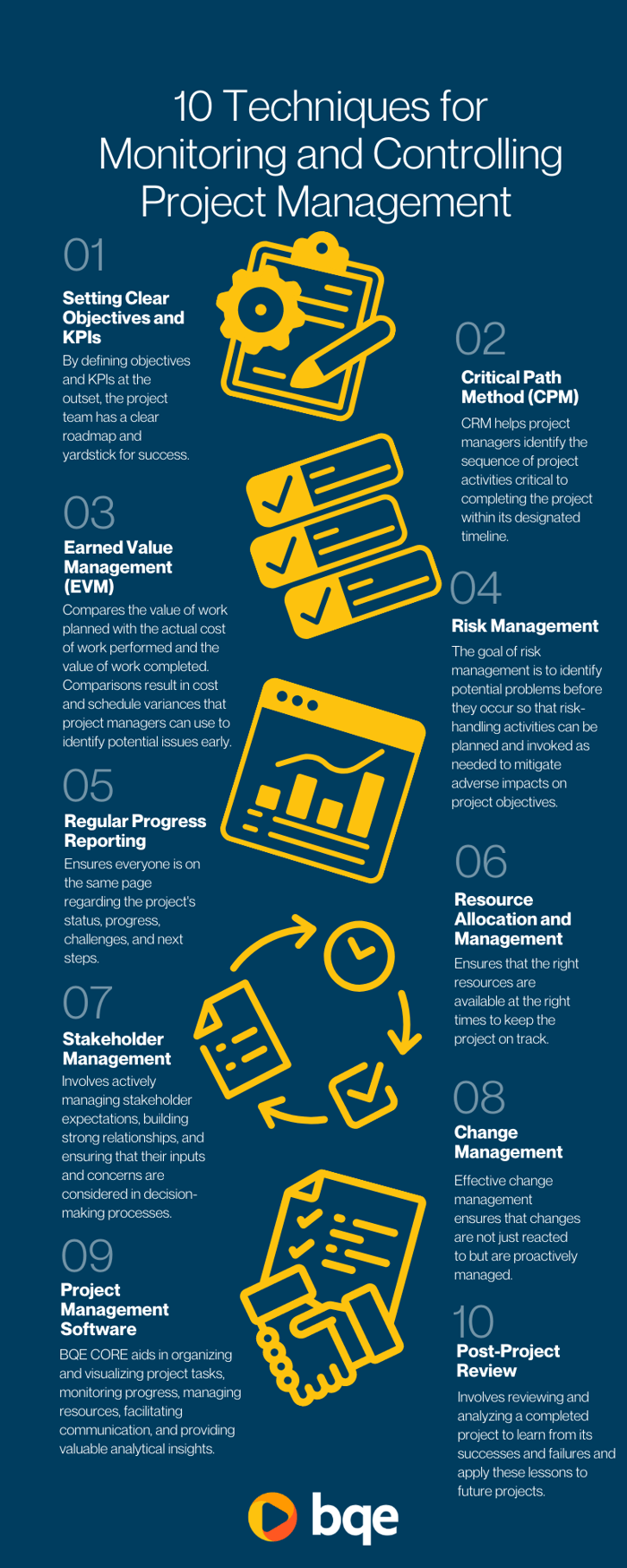Projects are the pistons that drive the engine of every firm. In order to have a successful, profitable firm that runs smoothly, your team leaders need to have the right tools and follow the best procedures to ensure each and every project is a success. Here are 10 tangible and practical aspects to monitoring and controlling project management that every manager should have at their disposal.
Monitoring and Controlling in Project Management
By mastering the following monitoring and controlling technique for project management, architects and engineers can ensure that their projects are delivered on time, within budget, and meet their intended objectives.

Let’s get started.
1. Setting Clear Objectives and Key Performance Indicators (KPIs):
Setting clear objectives and Key Performance Indicators (KPIs) is a foundational step in effective project management. For A/E firms, project objectives should be aligned with the client's vision, regulatory standards, and practical considerations like budget and timeline.
These objectives must be SMART - Specific, Measurable, Achievable, Relevant, and Time-bound.
For example, an objective could be "To complete the design and construction documents for a new single-family residence based on the client’s program and have it constructed by December 31, 2024, with a construction cost not to exceed $600/square foot.”
Once objectives are set, KPIs are established to track and measure progress toward these goals.
Very often A/E projects have a detailed work breakdown structure (WBS) and the KPIs that can be relevant include metrics like 'Percent of Tasks Completed On-Time', 'Budget Variance', 'Client Satisfaction Score', or 'Quality Assurance Metrics'.
By defining objectives and KPIs at the outset, the project team has a clear roadmap and yardstick for success, ensuring everyone is working towards the same goals and can be held accountable for their part in achieving them.
It also allows project managers to quickly identify when a project is veering off course, enabling early intervention to steer it back on track.
2. Critical Path Method (CPM):
The Critical Path Method (CPM) is a highly effective technique that helps project managers identify the sequence of project activities critical to completing the project within its designated timeline.
In A/E firms, tasks are often interdependent - for example, you might need to achieve approvals from governmental authorities before submitting for a permit. Identifying these on the timeline is critical.
CPM involves mapping out all project tasks, the time each task will take, and their dependencies to identify the longest sequence of tasks - the "critical path". These are the tasks that directly influence the project's completion date. If any task on the critical path is delayed, it will delay the entire project.
This method allows project managers to focus resources and attention on these crucial tasks, mitigating the risk of project delays. It also aids in foreseeing potential bottlenecks and provides valuable information for making informed scheduling, resourcing, and budgeting decisions.
Understanding the critical path can empower architects and engineers to ensure efficient project execution and on-time delivery.
3. Earned Value Management (EVM):
Earned Value Management (EVM) is a quantitative project management technique that integrates scope, time, and cost data to provide a unified view of project performance and progress.
EVM is especially useful in large architectural and engineering projects where there are numerous moving parts, making it difficult to have a clear picture of the overall project status.
The EVM system works by comparing the value of work planned (Planned Value) with the actual cost of work performed (Actual Cost) and the value of work completed (Earned Value). These comparisons result in cost and schedule variances that project managers can use to identify potential issues early and adjust plans accordingly.
For instance, if the Earned Value is less than the Planned Value, the project is behind schedule. If the Actual Cost is higher than the Earned Value, the project is over budget.
By monitoring these variances, project managers can forecast future performance trends and make necessary corrections, ensuring projects stay on track and within budget.
4. Risk Management:
Risk management is an indispensable part of project management, especially in the fields of architecture and engineering where projects often involve high stakes, large budgets, and complex operations.
The goal of risk management is to identify potential problems before they occur so that risk-handling activities can be planned and invoked as needed to mitigate adverse impacts on project objectives.
The process typically involves four steps:
-
risk identification
-
risk assessment
-
risk mitigation planning
-
risk monitoring
Project teams systematically identify potential risks, assess their potential impact and likelihood, develop strategies to handle these risks, and continuously monitor and adjust plans as the project progresses and new risks emerge.
In an architectural or engineering context, risks can range from design errors, unexpected site conditions, and regulatory changes, to cost overruns or delays in construction. A well-structured risk management strategy helps project teams anticipate challenges and prepare contingency plans, contributing to smoother project execution, improved client satisfaction, and overall project success.
5. Regular Progress Reporting:
Regular progress reporting is a vital project management technique that keeps all stakeholders informed and aligned.
In the realm of architecture and engineering, projects often involve a variety of stakeholders, including clients, contractors, regulatory bodies, and internal team members. Regular reports ensure that everyone is on the same page regarding the project's status, progress, challenges, and next steps.
Reports typically include updates on completed tasks, upcoming tasks, milestones reached, budget status, and any issues or risks that have arisen. They can also include performance metrics related to the project's objectives and Key Performance Indicators (KPIs).
By promoting transparency and open communication, regular progress reporting can help preempt misunderstandings or misinformation, facilitate swift problem-solving, and foster trust among stakeholders. It also provides an opportunity for project managers to recognize and celebrate team achievements, boosting morale and motivation.
6. Resource Allocation and Management:
Resource allocation and management is a key aspect of project management. Depending on the business model for the firm, resources typically include personnel, but can also include equipment, materials, or anything else needed to complete the project tasks.
Effective resource allocation involves ensuring that the right resources are available at the right times to keep the project on track. It requires careful planning and coordination, taking into account resource availability, skills, cost, and the project timeline.
Resource management also involves monitoring resource utilization throughout the project to ensure that resources are being used effectively and efficiently. This might include adjusting resource assignments based on task progress or changing priorities or resolving resource conflicts and over-allocations.
By effectively managing resources, project managers can avoid bottlenecks, minimize idle time, and ensure that the project progresses smoothly and cost-effectively. It also helps prevent burnout in teams by ensuring workloads are distributed evenly and realistically, contributing to a healthier, more productive working environment.
7. Stakeholder Management:
Stakeholder management is a key aspect of successful project management. In the context of A/E firms, stakeholders may include clients, contractors, suppliers, government agencies, team members, and even the public.
Effective stakeholder management starts with identifying all the project stakeholders and understanding their interests, expectations, and level of influence. Communication is crucial - keeping stakeholders informed and engaged through regular updates and feedback sessions.
Stakeholder management goes beyond mere communication. It also involves actively managing stakeholder expectations, building strong relationships, and ensuring that their inputs and concerns are considered in decision-making processes.
By doing so, project managers can build a strong support base for the project, preempt and manage conflicts, and facilitate smoother project execution. Furthermore, positive stakeholder relationships can lead to future opportunities, enhancing the firm's reputation and positioning it for continued success.
8. Change Management:
Change Management is an essential component of project management, especially in the dynamic environments of architectural and engineering projects. Throughout a project's life cycle, changes are inevitable, whether they stem from revised client requirements, unexpected site conditions, regulatory updates, or unforeseen challenges.
Change management involves a structured process to handle these changes effectively. This process typically includes the identification and documentation of the change, assessment of its impact on the project's scope, timeline, and budget, decision-making on whether to approve the change, and implementation of the change in a controlled manner if approved.
Effective change management ensures that changes are not just reacted to but are proactively managed. It helps maintain control over the project, minimize disruptions, and keep the project aligned with its objectives even when changes occur. By fostering adaptability, change management contributes to the project's resilience and ultimate success.
9. Using Project Management Software:
The use of project management software has become increasingly critical in effectively managing complex architectural and engineering projects. Such software aids in organizing and visualizing project tasks, monitoring progress, managing resources, facilitating communication, and providing valuable analytical insights.
A particular software solution well-suited to the needs of architects and engineers is BQE CORE. This comprehensive platform streamlines project management with features like time and expense tracking, project accounting, and resource allocation. It can also produce intuitive reports and dashboards, giving project managers a real-time overview of project performance and financial health. These reports can be automated based on the unique schedules needs of the manager and enable data to be disseminated without the involvement of the manager or any support staff.

BQE CORE offers industry-specific capabilities, such as architectural project management and engineering-specific billing. The software's ability to integrate project management with accounting and billing can significantly enhance efficiency and profitability. By leveraging BQE CORE, architectural and engineering firms can manage their projects more effectively and free up time to focus on their core competencies - designing and engineering solutions for their clients.
10. Post-Project Review:
The Post-Project Review, also known as a project post-mortem or project retrospective, is a valuable practice in project management. It involves reviewing and analyzing a completed project to learn from its successes and failures and apply these lessons to future projects.
In the context of architectural and engineering projects, a post-project review might examine design accuracy, adherence to timeline and budget, stakeholder satisfaction, project team performance, and any issues or challenges encountered.
The review should not just focus on what went wrong; it's equally important to identify what went right, why it went right, and how to replicate that success in future projects.
By conducting these reviews, architects and engineers can continuously improve their project management practices, enhancing efficiency, effectiveness, and client satisfaction. It fosters a culture of learning and continuous improvement, contributing to the long-term success of the firm.
Monitoring and Controlling in Project Management
By mastering these techniques, architects and engineers can ensure that their projects are delivered on time, within budget, and meet their intended objectives.
And if you want an easy way to aid in monitoring and controlling your project management, try a free demo of BQE CORE. When you use the right software to manage your projects, you’ll be able to regularly measure progress on every project to ensure they continue to meet your objectives and address your client’s needs.




